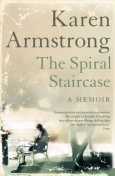BKMT READING GUIDES
Spiral Staircase
by Karen Armstrong
Paperback : 368 pages
1 club reading this now
0 members have read this book
Introduction
A raw, intensely personal memoir of spiritual exploration from one of the world,s great commentators on religion. After seven years in a convent, which she left, dismayed by its restrictions, an experience recounted in 'Through the Narrow Gate,, Karen Armstrong struggled to establish herself in a new way of life, and became entrapped in a downward spiral, haunted by despair, anorexia and suicidal feelings. Despite her departure from the convent she remained within the Catholic Church until the God she believed in 'died on me', and she entered a 'wild and Godless period of crazy parties and numerous lovers,. Her attempts to reach happiness and carve out a career failed repeatedly, in spectacular fashion. She began writing her bestseller 'A History of God, in a spirit of scepticism, but through studying other religious traditions she found a very different kind of faith which drew from Christianity, Judaism and Islam and, eventually, spiritual and personal calm. In her own words, her 'story is a graphic illustration - almost an allegory - of a widespread dilemma. It is emblematic of a more general flight from institutional religion and a groping towards a form of faith that has not yet been fully articulated but which is nevertheless in the process of declaring itself,. Her lifelong inability to pray and to conform to traditional structures of worship is shared by the many who are leaving the established churches but who desire intensely a spiritual aspect to their lives. 'The Spiral Staircase, grapples with the issue of how we can be religious in the contemporary world, and the place and possibility of belief in the 21st-century.
Karen Armstrong speaks to the troubling years following her decision to leave the life of a Roman Catholic nun and join the secular world in 1969. What makes this memoir especially fascinating is that Armstrong already wrote about this era once---only it was a disastrous book. It was too soon for her to understand how these dark, struggling years influenced her spiritual development, and she was too immature to protect herself from being be bullied by the publishing world. As a result, she agreed to portray herself only in as "positive and lively a light as possible"---a mandate that gave her permission to deny the truth of her pain and falsify her inner experience. The inspiration for this new approach comes from T. S. Eliot's Ash Wednesday, a series of six poems that speak to the process of spiritual recovery. Eliot metaphorically climbs a spiral staircase in these poems---turning again and again to what he does not want to see as he slowly makes progress toward the light. In revisiting her spiral climb out of her dark night of the soul, Armstrong gives readers a stunningly poignant account about the nature of spiritual growth. Upon leaving the convent, Armstrong grapples with the grief of her abandoned path and the uncertainty of her place in the world. On top of this angst, Armstrong spent years suffering from undiagnosed temporal lobe epilepsy, causing her to have frequent blackout lapses in memory and disturbing hallucinations---crippling symptoms that her psychiatrist adamantly attributed to Armstrong's denial of her femininity and sexuality. The details of this narrative may be specific to Armstrong's life, but the meanin! g she makes of her spiral ascent makes this a universally relevant story. All readers can glean inspiration from her insights into the nature of surrender and the possibilities of finding solace in the absence of hope. Armstrong shows us why spiritual wisdom is often a seasoned gift---no matter how much we strive for understanding, we can't force profound insights to occur simply because our publisher is waiting for them. With her elegant, humble and brave voice, she inspires readers to willingly turn our attention toward our false identities and vigilantly defended beliefs in order to better see the truth and vulnerability of our existence. Herein lies the staircase we can climb to enlightenment. --Gail Hudson
Discussion Questions
No discussion questions at this time.Book Club Recommendations
Recommended to book clubs by 0 of 0 members.
Book Club HQ to over 90,000+ book clubs and ready to welcome yours.
Get free weekly updates on top club picks, book giveaways, author events and more








